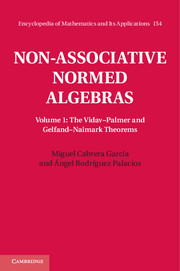1 - Foundations
Published online by Cambridge University Press: 05 August 2014
Summary
Rudiments on normed algebras
Introduction In this section we develop the basic theory of normed algebras, putting special emphasis on the case of complete normed unital associative complex algebras. Non-associative normed algebras are considered only when they do not offer special difficulties, or when the difficulties can be overcome in an elementary way. Thus, this section is mainly devoted to attracting the attention of the nonexpert reader, although the expert reader should browse through it in order to become familiar with the definitions and symbols introduced here, which need to be kept in mind throughout the whole book.
Subsection 1.1.1 deals with the basic spectral theory, and culminates with the proof in Theorem 1.1.46 of the celebrated Gelfand–Beurling formula. In Subsection 1.1.2, we prove Rickart's dense-range-homomorphism theorem. Subsection 1.1.3 deals with the Gelfand theory for complete normed unital associative and commutative complex algebras, as stated in Theorem 1.1.73, and some applications are discussed. In Subsection 1.1.4, we introduce topological divisors of zero in a normed algebra, and involve this notion to prove in Corollary 1.1.95 that (bounded linear) operators on a Banach space are neither bounded below nor surjective whenever they lie in the boundary of the set of all bijective operators. Subsections 1.1.5 and 1.1.6 discuss the complexification, the unital extension, and the completion of a normed algebra.
- Type
- Chapter
- Information
- Non-Associative Normed Algebras , pp. 1 - 93Publisher: Cambridge University PressPrint publication year: 2014

